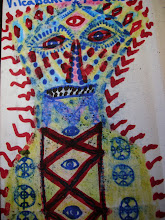The manuscript which I shall henceforth present to you lingers somewhere in those remote regions between ethnography and delusion. This need not be a cause for alarm. Samuel Clemens once wrote: “It's no wonder that truth is stranger than fiction. Fiction has to make sense.” This being said, certain facts are clear enough: in May 2008 a young anthropology student or as he would come to call himself, the anthropolyjest, arrived in Vilcabamba, Ecuador with the goal of recording the oral histories of the town’s famous centenarians and investigate the “extraordinary natural qualities” of the area. As he wrote in his application essay for the ILAS: “It’s time for an anthropological study to record what the scientists missed: the inner fabric of the native peoples’ lives.” We know he boarded at the Rumi Wilco ecolodge and began asking questions. From that point onward he became engulfed in, as he puts it, “the town’s sinister mystery.”
Then, at some uncertain point, he suddenly disappeared into the mountains. All that was found was his waterlogged folder of distorted and bleeding ink, tied together with a shoestring. Scrawled across its face in red and blue magic marker were the words:
Sensitive Research
Left to us is a seemingly mad assemblage of documents: letters, journals, photographs, transcribed conversations, newspaper clippings, guidebook entries, ethnographies, environmental laws, ecological studies, poetry and esoteric literature. Upon closer examination it is clear that he worked over the material obsessively. His objective seems to have been to recreate, for the reader, his own estranged experience of fieldwork, what Malinowski famously phrased, “the imponderabilia of everyday life.” There is at once, a frightening promiscuity to the investigator’s scope and yet a singular paranoia fixated on the sense of an all-inclusive lie, a “public secret”, the limits of which he is uncertain. It is for you to judge whether he fell prey to a romantic fever, a quixotic striving after the authentic ideal, or if he correctly diagnosed the symptoms of the pervasive modern disease.

No comments:
Post a Comment